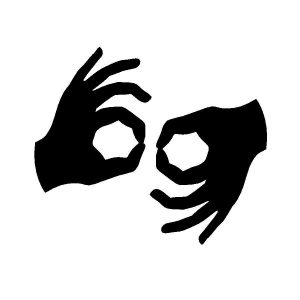Widgetized Section
Go to Admin » Appearance » Widgets » and move Gabfire Widget: Social into that MastheadOverlay zone
COVID-19 Communication and Deaf Americans
The views expressed are those of the author and do not necessarily reflect the views of ASPA as an organization.
By Katie Leigh Robinson
July 5, 2020

Since the early months of 2020, Americans have been watching and listening to President Trump, state governors and local government officials give briefings on COVID-19 and the government response to it. For many of us, experiencing these briefings has been a relatively smooth process, the only hurdle being the occasional poor cell signal. For one group of Americans, however, watching these briefings has been a much more difficult process.
Deaf Americans have been requesting the presence of American Sign Language (ASL) interpreters at government briefings since before the Americans with Disabilities Act (ADA) was passed in 1990. ADA has provided substantial accommodations for Americans who need them and requires all communications to be equally accessible to those with disabilities. This regulation is not universally followed but is not as much of a problem if the president is announcing a new Supreme Court Justice or a new initiative that will be written about on news sites—though Deaf Americans would certainly prefer to learn these things with the rest of the country.
It is, however, a problem when the government is making emergency announcements where there is little time for Americans to prepare. Hurricane Katrina proved this in 2005, when a disproportionate percentage of people who died were in some way disabled, according to the National Council on Disabilities (NCD). In their report on the response to Hurricanes Katrina and Rita, NCD quoted a Deaf individual whose local TV channel cut the ASL interpreter out of the frame. “All I saw was an elbow,” said the survivor. In November of 2005, just two months after Katrina and one month after Rita, the FCC amended its Emergency Alert System rules to provide equal access to people with visual, auditory or other sensory disabilities.
Since these tragedies, the use of ASL interpreters in government communications has increased significantly. Hurricanes Harvey and Irma saw much more success in providing information to people with disabilities, with even hearing people (those without an auditory disability) commenting on how much they enjoyed watching interpreters. For instance, a 2016 article in the Houston Chronicle noted how Ashley Henderson of Houston, TX, garnered nationwide attention through her use of facial expressions, which communicate tone and emphasis for those who use ASL.
It was a surprise, therefore, when many government briefings regarding COVID-19 did not include an ASL interpreter. Specifically, the White House briefings did not utilize the services of an ASL interpreter, and many Deaf Americans felt they were the last to know information that was vitally important. In early March the CEO of the National Association of the Deaf, Howard A. Rosenblum, sent a letter to the White House Communications Office urging them to employ ASL interpreters for the press conferences and briefings. By the beginning of May, there was still no ASL interpreter in sight at the White House briefings, and the Congressional Deaf Caucus—a bipartisan caucus advocating for equal access for the Deaf community—sent a letter to the White House insisting that ASL interpreters are needed at the briefings. As of June 24, 2020, there is still no ASL interpreter at these briefings.
This situation leads to questions about the implementation and enforcement of equal access to information. To address this, some researchers and lawmakers have looked to other countries for inspiration. One such country is Uganda. In 1995, Uganda recognized Ugandan Sign Language (USL) in their Constitution and pledged to promote its usage and development. By recognizing USL in the Constitution, Uganda has created a requirement that USL is used in every official communication by their Federal government. USL is not an official language in Uganda, but is officially recognized, thus creating the requirement. While the United States does not have any official language, advocates suggest that officially recognizing ASL as a language in the United States would provide a stronger precedent for using ASL interpreters at official press conferences and White House briefings. Other proponents have pushed for ASL to be adopted as an official language, but the United States has historically refused to declare an official language on the Federal level, due to the myriad languages spoken by Americans. The best solution, according to some, would be to amend the Americans with Disabilities Act to specify ASL as a necessity for emergency communication rather than the more general phrasing, “Equitable access”. Perhaps such specificity would inspire Federal politicians to include ASL interpreters in their briefings and even prompt some states to adopt it as an official language.
Author: Katie Leigh Robinson is a Ph.D. student at the University of Texas at Dallas. She studies accessibility policy, education policy and social equity in the policy process.


 (6 votes, average: 4.33 out of 5)
(6 votes, average: 4.33 out of 5)
LaMesha Craft
July 6, 2020 at 9:32 pm
I really appreciate the information and the perspective on such an important issue.
Alexander Rodriguez
July 6, 2020 at 2:13 pm
With the current situation (from the pandemic to the political environment going into an election and all between), you are so right that that any information must be made available and accessible to EVERYONE. Closed captioning is not enough, since you could lose the urgency and nuance in just words without any context. Thank you for the education. The government (and many others) need to do better so that everyone is ready and no one is excluded.
Gail Blanscet
July 5, 2020 at 9:45 am
Very informative and helpful! Thank you Katie! Well done you!